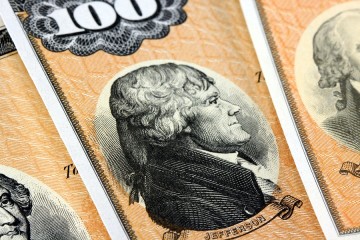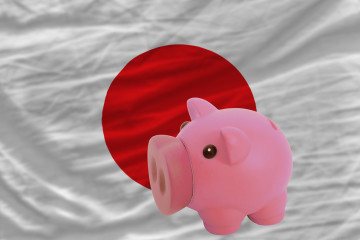Recession Ignored by Japan Investors as Profits Drive Rally

©2015 Bloomberg News
NXVW5R6JIJU
(Bloomberg) — If Japan’s economy is in trouble, you wouldn’t know it from the stock market.
In what’s shaping up to be a pretty forgettable year for global equity investors, Prime Minister Shinzo Abe’s Japan is one of the few places providing double-digit returns that are backed by profit growth. The 12 percent gain for the Nikkei 225 Stock Average through last week came as its companies post record earnings, and valuations rose just 2.3 percent from the end of last year.
Even as a report Monday showed the nation fell back into recession, corporate Japan is proving it can increase profits without a stronger economy. Of course, executives have a powerful ally in global central bankers. After stimulus kicked off the share rally under Abe and Haruhiko Kuroda, the U.S. interest-rate outlook is re-establishing the yen’s downward trajectory and boosting income at exporters.
“The share market is expressing confidence in Abenomics even though the economic data has been patchy,” said Shane Oliver, Sydney-based strategist at AMP Capital Investors Ltd., which oversees about $110 billion. “The yen falling over the last few years is feeding into profits and you still have an aggressive monetary situation in Japan.”
Globally, only two other stock markets can boast similar gains this year without stretching valuations, data compiled by Bloomberg show. They’re both in the eurozone, where central bank easing is also a defining feature.
Global Losses
Gains in Japan contrast with losses from New York to Hong Kong and Sydney that dragged a gauge of global equities down 4.4 percent in 2015 through last week. China’s deepening economic slowdown and shock devaluation of the yuan sank emerging-market equities, while investors across the globe tussled with the prospect of the first U.S. rate increase since 2006. Shares slid Monday as the terror attacks in Paris spurred investors to shun riskier assets.
After starting strongly, Japan got sucked into the global selloff as the Nikkei 225 tumbled 19 percent from a peak in June to a low on Sept. 29. Since then it’s the fourth-best performer of 93 benchmark equity gauges tracked by Bloomberg.
For one clue why, look to the currency, says Credit Suisse Group AG. The yen started weakening against the dollar as global markets settled, Japanese earnings continued to rise and expectations for further easing contrasted with increasing signs of tighter monetary policy in the U.S. Exporters led gains on the Nikkei 225, with Screen Holdings Co., Mazda Motor Corp. and Tokyo Electron Ltd. each rising more than 40 percent. Foreign investors turned net buyers of Japanese stocks in October for the first time in five months.
Record Profit
“There’s the impact from the yen, global markets have calmed down, and the recovery in earnings isn’t doing badly,” said Basil Dan, head of equity sales at Credit Suisse in Tokyo.
Operating profit for the longstanding members of the Nikkei 225 that have posted results for the three months ended September rose to a new record 7.7 trillion yen ($62.8 billion), according to data compiled by Bloomberg. Toyota Motor Corp. reported another quarter of record operating earnings because of a weak yen, and the carmaker managed to beat analyst estimates by 3.1 percent too. Of the members of the broader Topix index that have announced results, 55 percent topped analyst estimates for profit.
Like Belgium
The Nikkei 225 traded at 17.7 times estimated earnings at Friday’s close, down from a peak of 19.7 in May 2013. The only other markets where benchmark stock gauges posted double-digit returns this year and valuations increased less than 3 percent are Ireland and Belgium, which are also benefiting from monetary easing that weakens their shared currency.
“The fact that the price-earnings ratio hasn’t increased much shows that analysts are raising their estimates for Japanese earnings,” said Yoshinori Shigemi, a global market strategist in Tokyo at JPMorgan Asset Management. “Globally, it’s still relatively cheap and there’s still way more room to buy.”
Economists don’t share the optimism. They lowered their predictions for third-quarter gross domestic product after data from household spending to exports signaled weakness. That turned out to be the right move: GDP shrank by an annualized 0.8 percent in the three months, following a revised 0.7 percent drop in the quarter ended June, the Cabinet Office said Monday in Tokyo.
Not everyone in the stock market does, either. UBS Group AG says half the institutional investors they surveyed during a U.S. visit this month have negative outlooks for Japanese stocks. For many, the only catalyst for a further boost was additional easing from the BOJ.
More Cautious
“A growing number of investors are taking a more cautious, cynical view of the Japanese economy and stock market,” wrote UBS economist Daiju Aoki and strategist Tomohiro Okawa in a Nov. 10 report. “The phase of investors blindly ‘buying because stocks are rising, and stocks rising because of buying’ has ended.”
The Topix slipped 0.8 percent as of 9:55 a.m. in Tokyo, while the Nikkei 225 lost 0.9 percent.
“There’s short-term risk off in Japan as people digest the GDP numbers,” said Andrew Clarke, director of trading at Mirabaud Asia Ltd., a Hong Kong brokerage. “GDP being worse than expected will give the Japan bears something to talk about, but long-term it means more stimulus on its way.”
AMP’s Oliver says there are plenty of other reasons to buy. He says Japan is less exposed to slowing growth in emerging economies than its Asian neighbors, and Abe’s policy program is working.
“If the equity market is a gauge of expectations for a country’s future economic performance, it’s sending a signal of confidence in Abenomics,” AMP’s Oliver said. “You can’t turn around a 25-year malaise overnight.”
To contact the reporters on this story: Anna Kitanaka in Tokyo at akitanaka@bloomberg.net; Nao Sano in Tokyo at nsano3@bloomberg.net To contact the editors responsible for this story: Sarah McDonald at smcdonald23@bloomberg.net Tom Redmond







No Comment